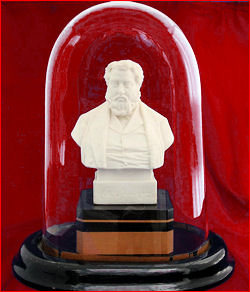So last time: I asked the question whether the folks who turned out for Passion2013 turned out for Jesus or Religion, and I gave one answer: a Jesus-event (from the Bible) which looks like this one looks turns out people who experience a revival and not just an emotional high. It might look like religion if what we see instead is a superficial change, a temporary emotional sweetness which, let's face it, is not self-sustaining.
How else could we tell if this was about Jesus and not merely religion?
How about this one:
Where is the one who is wise? Where is the scribe? Where is the debater of this age? Has not God made foolish the wisdom of the world? For since, in the wisdom of God, the world did not know God through wisdom, it pleased God through the folly of what we preach to save those who believe. For Jews demand signs and Greeks seek wisdom, but we preach Christ crucified, a stumbling block to Jews and folly to Gentiles, but to those who are called, both Jews and Greeks, Christ the power of God and the wisdom of God. For the foolishness of God is wiser than men, and the weakness of God is stronger than men.
For consider your calling, brothers: not many of you were wise according to worldly standards, not many were powerful, not many were of noble birth. But God chose what is foolish in the world to shame the wise; God chose what is weak in the world to shame the strong; God chose what is low and despised in the world, even things that are not, to bring to nothing things that are, so that no human being might boast in the presence of God. And because of him you are in Christ Jesus, who became to us wisdom from God, righteousness and sanctification and redemption, so that, as it is written, “Let the one who boasts, boast in the Lord.”
You know: that fellow Paul is an interesting case study -- because when we think of him, somehow we think of a mash-up of Carl Trueman and Charleton Heston. He's God's man after all, and he should be smart but not unreachable, grandfatherly in his gravitas, good-looking, and compelling. And we think -- this is a group "we" here, not just a shot across the bow at the new young and hip crowd -- that this is how God reached the ancient world. He sent a guy with 1st-century media saavy to write the NT and appear in live shows to get the word out.
But you know something? That's not Paul at all. In fact: he spends a good deal of time telling the Corinthians that one of the problems they are facing is that they want their own clever and good-looking fellows to take his place. I mean seriously: that is exactly what they wanted, and Paul says, "well, God has already made all that stuff foolish. You can tell because he sent me to preach to save those who believe."
Now, I know what the Passionistas accidentally reading this post are about to say: "Hey dude: we had Piper there. Are you saying that Piper is not a good preacher?"
No dude: I am not saying that.
What I am saying is that the kid in my hypothetical example went to a rock concert -- and the headliners were the all-star talkers. S/he went to see men (and women, right?) of huge reputation, and also some headliner bands in order to feel a certain way about his/her endorsement of Jesus -- but no human will boast in the presence of God. And the proof, if I might say so, of what actually happened there is what is happening now, since he or she came home.
A lot of people hate it when I do this, but I'm doing it anyway: 60,000 people were there. If we randomly distributed 60,000 loaded guns into the places all these people just came from -- just sent them back in the QTYs these people came from those places -- I'll bet you something would change in those communities. If we sent out 60,000 lunchboxes full of $20's into those communities in the same way, I'll bet something would change -- maybe something small, but something. If we sent 60,000 bullhorns out into those communities and just laid them down on the ground there, something would change.
In this hypothetical case, 60,000 hypothetical people are coming home to some fraction of 60,000 local churches. Let me be as clear as possible: they are coming home to what we hope are a corresponding number of local churches. If they are anything like their parents, they may not have a local church at all. But if past performance is any indication of future results, they will not have the same scope of impact as 60,000 handguns or lunchboxes or bullhorns. The show will be over. Somehow, for them, being in the local church -- which is God's plan for the believer -- is not the same as going to an event with headliners. Paul says that, somehow, the local church ought to be better than that -- and it seems to me that here we can see that it is not.
A year ago, Jeff Bethke said, "Jesus and religion are on opposite spectrum - See one's the work of God, but one's a man made invention - See one is the cure, but the other's the infection." At the end of it, it is not our intention which makes something Holy: it is God's intention. And it's God's intention that the Gospel be proclaimed not from a concert stage in an arena intended for entertaining spectacles: it's his intention that it be declared from the local church.
That's why Paul also said this:
For I think that God has exhibited us apostles as last of all, like men sentenced to death, because we have become a spectacle to the world, to angels, and to men. We are fools for Christ's sake, but you are wise in Christ. We are weak, but you are strong. You are held in honor, but we in disrepute. To the present hour we hunger and thirst, we are poorly dressed and buffeted and homeless, and we labor, working with our own hands. When reviled, we bless; when persecuted, we endure; when slandered, we entreat. We have become, and are still, like the scum of the world, the refuse of all things.Think of the plea Paul is making here to the Corinthians: the ones who are really bringing the message of Christ to the world have become like trash, like the muddy part you scrape off in a bath -- and all of you Corinthians think that you are better than that. This is something someone like Judah Smith ought to spend a few years contemplating before he continues in the family business, but it is especially something people seeking a Cotton-Bowl sized event ought to consider fully before continuing to endorse and expand such a thing.
The problem is not that God doesn't love large churches, or doesn't want large churches. The problem is not that God doesn't want us to glorify God and enjoy Him now, which is the starting terminal point of forever. The problem is that when we imagine that the best way -- or even a co-equal way -- of knowing God and glorifying him and enjoying him is by the means of the world, and not the means of the Spirit, we have inverted God's plan for us.
"Wait, wait, wait, wait," objects the hypothetical example, "How is it that suddenly TeamPyro is so concerned about the means of the Spirit, and who are you to judge the way the Spirit moved in Georgia? Aren't you biased against moves of the Spirit? I mean: I was there. I saw it. I felt it. I know it was the means of the Spirit."
Well, I think I have already given 3 Biblical reasons why that's (at least) backwards reasoning: there was no revival, there was a backwards system of values driving the event, and it creates and elevates the wrong people the wrong way when it is all said and done. But: the problem is, at the end of the day, a Holy Spirit problem.
You remember Yesterday's post, yes? I hope so. I quoted the end of Acts 2 in that post to show what ought to happen when there is actual revival, but there's a funny part at the beginning of Acts 2 which maybe we should review since I have dragged the Holy Spirit into this discussion:
When the day of Pentecost arrived, they were all together in one place. And suddenly there came from heaven a sound like a mighty rushing wind, and it filled the entire house where they were sitting. And divided tongues as of fire appeared to them and rested on each one of them. And they were all filled with the Holy Spirit and began to speak in other tongues as the Spirit gave them utterance.You know: as we say in theses here parts, "Aha!"
Look: at the end of the day, it was the Holy Spirit which made the events in Acts 2 happen. What that means, in the least, is this: If the means of the Holy Spirit are used, the consequences the Spirit intends will result. And the consequences -- the necessary consequences -- of the means of the Holy Spirit will be the salvation of men, and the formation of a local church*. In the worst case, if a local church is not formed, the very least will be that the local church will be edified or fortified or in some way improved.
The means of the Spirit are not the things which make us feel good and seem right in our own eyes -- even though they are never found or hinted at in the Bible. They are certainly not the things which, when we see them in the Bible, an Apostle expressly condemns. They are also not the things which, when we see them, we can rejigger into something we enjoy a little more.
So: consider your calling, hypothetical example. Consider what it is exactly the preaching of God's word and the singing of His praises ought to do to you and for you. I will be willing, for the sake of not consuming your whole day, to stipulate that every word spoken at Passion2013 was worth hearing**. If it was, what are you doing with it? Why was the experience more important than the consequences?
I leave it for your consideration, and your own edification Be with the Lord's people in the Lord's house on the Lord's day this weekend -- because that's where the real means of the Spirit will greet you.
__________
*You know: or else, the condemnation of men and the hardening of their hearts into reprobation.
**Chris Rosebrough has some other thoughts on that, which I commend to you.





































